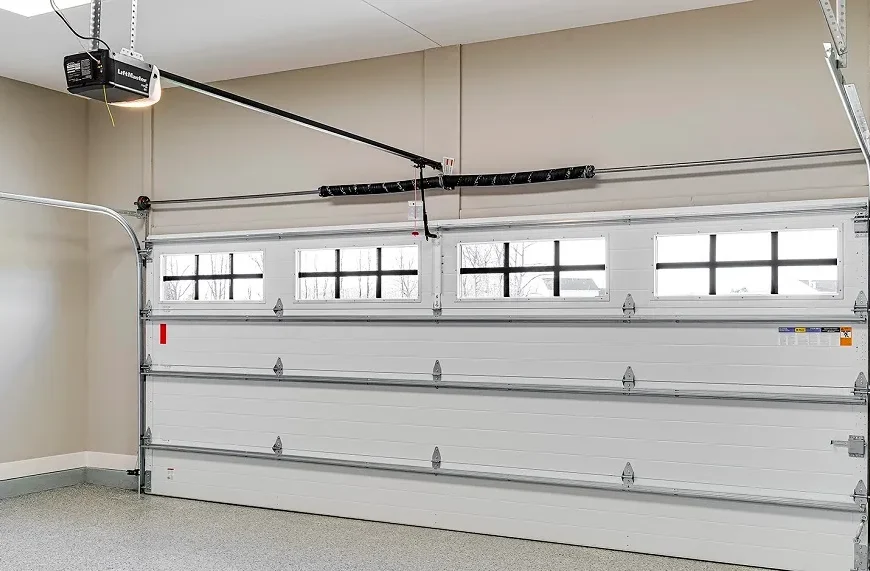In today’s fast-paced world, smartphones have become an integral part of our lives, serving as personal assistants, navigators, entertainment hubs, and even remote controls for various aspects of our homes. The evolution of smart technology has extended its reach to our garages, where smartphone apps now play a pivotal role in controlling garage door openers. In this article, we will explore the significant role of smartphone apps in garage door opener control, the benefits they offer, and how they are transforming the way we interact with our garage doors.
The Transformation of Garage Door Openers
Traditionally, operating a garage door required a physical remote control or, in some cases, a wall-mounted keypad. While these methods have served us well for decades, they often came with limitations. The need to carry a separate remote control, the risk of losing it, and the inconvenience of manually inputting keypad codes were common issues homeowners faced.
With the advent of smartphone technology and the rise of smart home ecosystems, garage door opener manufacturers recognized an opportunity to enhance the user experience. The result is a new era of garage door openers that can be controlled seamlessly through smartphone apps. Here are the key aspects that define the role of smartphone apps in garage door opener control:
- Remote Operation: Smartphone apps allow homeowners to open and close their garage doors remotely using their mobile devices. This means you can control your garage door from anywhere with an internet connection, providing unparalleled convenience.
- Security and Monitoring: Many garage door opener apps offer real-time monitoring features. You can receive alerts and notifications on your smartphone when the garage door is opened or closed, ensuring that you are always informed about the status of your garage.
- Multi-User Access: Smartphone apps enable homeowners to grant access to family members, friends, or service providers by creating unique profiles or access codes. This feature simplifies the process of sharing access while maintaining security.
- Integration with Smart Home Ecosystems: Garage door opener apps can often be integrated into larger smart home ecosystems, allowing for seamless control alongside other smart devices. This integration enables users to create custom automation routines and schedules.
- Enhanced Security Features: Smartphone apps for garage door openers often incorporate advanced security measures. These may include encryption, two-factor authentication, and rolling code technology, which changes the access code each time the garage door is operated to prevent unauthorized entry.
Benefits of Smartphone App Control for Garage Door Openers
The adoption of smartphone apps in garage door opener control has brought about a multitude of benefits for homeowners. Here are some of the most significant advantages:
- Convenience: The primary advantage of smartphone app control is convenience. No longer do you need to carry a separate remote control or memorize keypad codes. With your smartphone always within reach, opening and closing your garage door becomes effortless.
- Remote Access: Whether you’re at work, on vacation, or simply away from home, you can control your garage door remotely. This feature is particularly valuable for ensuring the security of your home while you’re away.
- Real-Time Monitoring: Smartphone apps provide real-time updates on the status of your garage door. You can receive alerts when the door is opened or closed, giving you peace of mind and security.
- Multi-User Access: Smartphone apps allow you to manage access to your garage by creating profiles for family members or granting temporary access to guests, such as friends or delivery drivers. You can easily revoke access when it’s no longer needed.
- Integration with Smart Home Devices: Smartphone app control often integrates seamlessly with other smart home devices, such as lights, thermostats, and security cameras. This allows you to create customized automation routines for enhanced convenience and security.
- Enhanced Security: Modern garage door opener apps prioritize security. Advanced encryption and rolling code technology make it difficult for unauthorized individuals to gain access to your garage.
Popular Garage Door Opener Smartphone Apps
Numerous garage door opener manufacturers offer dedicated smartphone apps to complement their products. Some of the popular garage door opener smartphone apps include:
- MyQ by Chamberlain: MyQ is a widely used app that is compatible with Chamberlain and LiftMaster garage door openers. It offers remote control, real-time monitoring, and integration with other smart home devices.
- Craftsman Smart Garage Door Opener: Craftsman offers a smartphone app for its garage door openers, allowing users to control their garage doors remotely and receive notifications.
- Genie Aladdin Connect: Genie’s Aladdin Connect app provides remote control, real-time status updates, and multi-user access for Genie garage door openers.
- GarageMate: GarageMate is a versatile app that can work with various garage door opener brands. It provides remote control and multi-user access features.
- Ryobi GD201: The Ryobi GD201 app is designed for use with Ryobi’s Ultra-Quiet Garage Door Opener. It offers remote control and monitoring capabilities.
- GoGogate: GoGogate is compatible with a wide range of garage door openers and offers remote control, real-time monitoring, and integration with popular smart home platforms.
Installation and Setup
Setting up a garage door opener smartphone app is typically straightforward and can be completed in a few simple steps. Here’s a general overview of the installation and setup process:
- Choose a Compatible Garage Door Opener: Ensure that your garage door opener is compatible with the smartphone app you plan to use. Check the manufacturer’s website or product documentation for compatibility information.
- Download the App: Visit the app store on your smartphone (App Store for iOS devices or Google Play Store for Android devices) and download the app associated with your garage door opener brand.
- Create an Account: Open the app and create an account if required. You may need to provide some personal information and set up a username and password.
- Connect to the Garage Door Opener: Follow the app’s on-screen instructions to connect the app to your garage door opener. This often involves scanning a QR code on the garage door opener or inputting specific information from your opener’s control panel.
- Configure Settings: Customize the app settings to your preferences. This may include setting up notifications, adding family members, or integrating with other smart home devices.
- Test the App: After setup is complete, test the app to ensure it can open and close your garage door. If necessary, create access profiles for family members or guests.
- Secure Your Account: Take steps to secure your app account, such as enabling two-factor authentication if available and regularly updating your password.
- Integrate with Smart Home Ecosystems (Optional): If you have other smart home devices, consider integrating your garage door opener app with your chosen smart home ecosystem (e.g., Amazon Alexa, Google Assistant, or Apple HomeKit) to create comprehensive automation routines.
Conclusion:
Smartphone apps have transformed the way we control and interact with our garage doors. They bring a new level of convenience, security, and accessibility to our homes, allowing us to manage our garage door openers from the palm of our hand. Whether you’re looking to open your garage door remotely, monitor its status, or integrate it with your smart home, a garage door opener smartphone app offers a range of benefits that enhance your daily life and simplify your home automation experience. Embrace the future of garage door control with the power of your smartphone.










